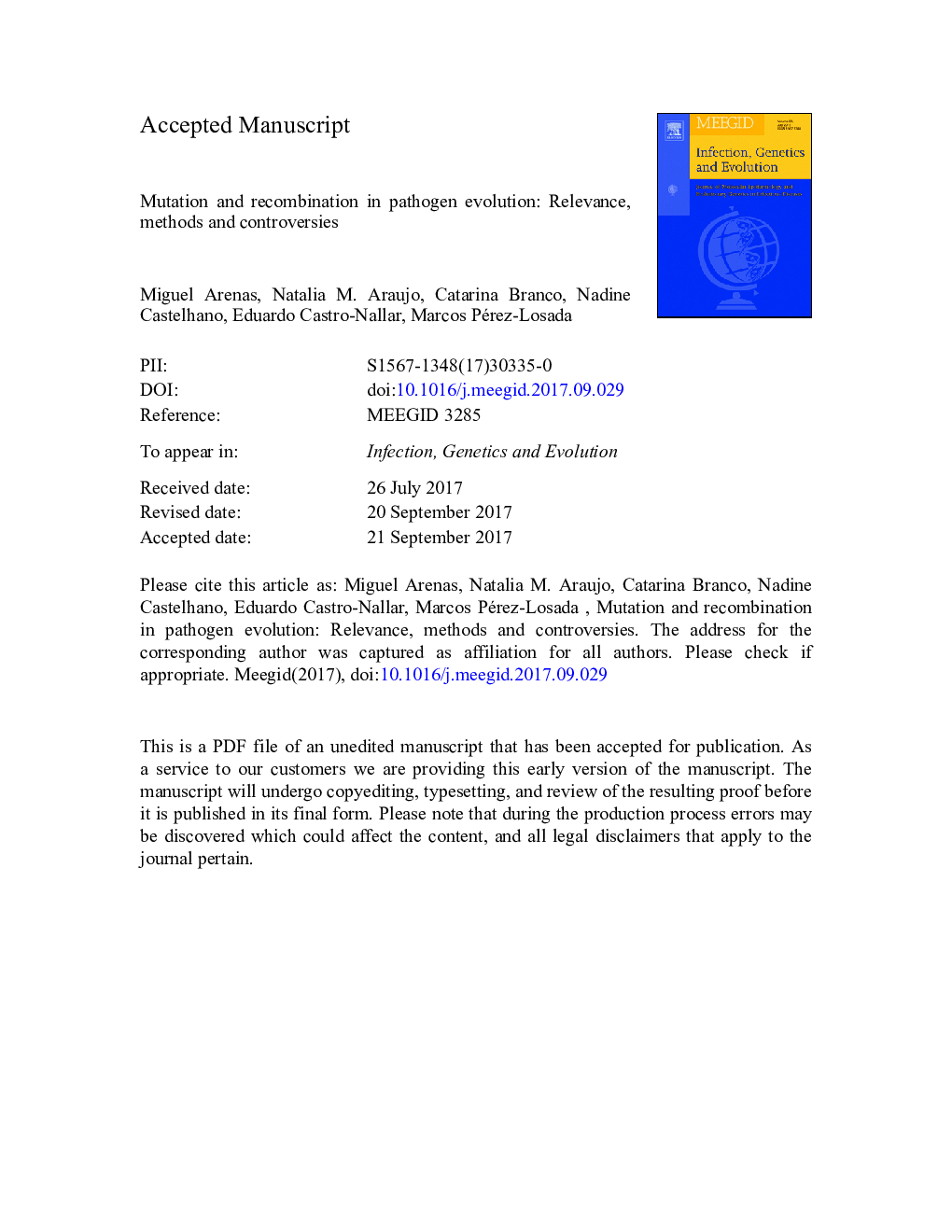| کد مقاله | کد نشریه | سال انتشار | مقاله انگلیسی | نسخه تمام متن |
|---|---|---|---|---|
| 8646687 | 1570140 | 2018 | 52 صفحه PDF | دانلود رایگان |
عنوان انگلیسی مقاله ISI
Mutation and recombination in pathogen evolution: Relevance, methods and controversies
ترجمه فارسی عنوان
جهش و نوترکیب در تکامل پاتوژن: مربوط بودن، روش ها و اختلافات
دانلود مقاله + سفارش ترجمه
دانلود مقاله ISI انگلیسی
رایگان برای ایرانیان
کلمات کلیدی
ترجمه چکیده
جهش و نوترکیب در تکامل بیشتر پاتوژن ها بوسیله تولید انواع ژنتیکی که بر انتخاب آن عمل می کند، رانده می شود. این گونه ها می توانند، به عنوان مثال، مقاومت در برابر سیستم ایمنی میزبان و درمان های دارویی یا منجر به شیوع اپیدمی شوند. با توجه به اهمیت آنها، مطالعات تکاملی متنوع، فراوانی و پیامدهای جهش و نوترکیب در جمعیت پاتوژن را مورد بررسی قرار داده اند. با این حال، برخی اختلافات در مورد سهم هر نیروی تکاملی در توسعه مشاهدات فنوتیپی خاص (مانند مقاومت دارویی) همچنان ادامه دارد. در این مطالعه، اهمیت جهش و نوترکیب در تکامل پاتوژن ها در سطوح درون میزبان و بین میزبان بررسی می شود. ما همچنین روش های تحلیلی پیشرفته ای را برای تشخیص و اندازه گیری این دو نیروی تکاملی، از جمله تعصبات که اغلب در مطالعات تکاملی نادیده گرفته می شود، توصیف می کنیم. در نهایت، برخی از مطالعات قبلی ما در مورد تاکسی های بیماریزا وجود دارد که در آن جهش و نوترکیب نقش مهمی در بهبود تناسب اندام بیماری، تولید تنوع ژنتیکی بین گونه ای و یا طراحی واکسن های متمرکز دارد. این بررسی همچنین چندین بحث مشترک و مشکلات در تجزیه و تحلیل و ارزیابی و تفسیر نتایج جهش و نوترکیب را نشان می دهد.
موضوعات مرتبط
علوم زیستی و بیوفناوری
علوم کشاورزی و بیولوژیک
بوم شناسی، تکامل، رفتار و سامانه شناسی
چکیده انگلیسی
Mutation and recombination drive the evolution of most pathogens by generating the genetic variants upon which selection operates. Those variants can, for example, confer resistance to host immune systems and drug therapies or lead to epidemic outbreaks. Given their importance, diverse evolutionary studies have investigated the abundance and consequences of mutation and recombination in pathogen populations. However, some controversies persist regarding the contribution of each evolutionary force to the development of particular phenotypic observations (e.g., drug resistance). In this study, we revise the importance of mutation and recombination in the evolution of pathogens at both intra-host and inter-host levels. We also describe state-of-the-art analytical methodologies to detect and quantify these two evolutionary forces, including biases that are often ignored in evolutionary studies. Finally, we present some of our former studies involving pathogenic taxa where mutation and recombination played crucial roles in the recovery of pathogenic fitness, the generation of interspecific genetic diversity, or the design of centralized vaccines. This review also illustrates several common controversies and pitfalls in the analysis and in the evaluation and interpretation of mutation and recombination outcomes.
ناشر
Database: Elsevier - ScienceDirect (ساینس دایرکت)
Journal: Infection, Genetics and Evolution - Volume 63, September 2018, Pages 295-306
Journal: Infection, Genetics and Evolution - Volume 63, September 2018, Pages 295-306
نویسندگان
Miguel Arenas, Natalia M. Araujo, Catarina Branco, Nadine Castelhano, Eduardo Castro-Nallar, Marcos Pérez-Losada,
